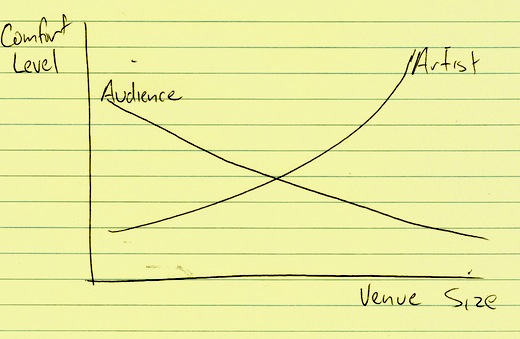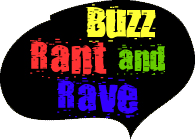1. The better the venue is for the performer, the worse it is for the audience.
2. Hearing songs for the first time is a very different experience than hearing them a second, third, sixteenth or 64th time.
Last night, I caught Them Crooked Vultures' debut NYC performance at Roseland Ballroom. Prior to the show, I had not heard more than a 30 second clip of any of their music. But a few factors convinced me to buy tickets for the show. The rhythm section comes from two of the greatest rock bands of all time (Led Zeppelin and Nirvana) and the guitarist/lead singer from a band that I appreciate and enjoy (Queens of the Stone Age). Aside from hearing a single, I went to The Raconteurs first appearance in New York with no more information than knowing the prior work of Jack White and Brendan Benson, and caught a great show. But I was only appropriately whelmed by Them Crooked Vultures. I suspect that the venue and familiarity kept this show from reaching the next level.
Venue & Comfort
Roseland is a pretty terrible place to see a concert. The sound is muddy and booming in the cavernous room. Any precise and dynamic bass playing just gets lost in the mud of Roseland's acoustics. Fortunately, John Paul Jones plays with a fairly distinctive sound that helps emphasize the attack at the beginning of each note. The sightlines from the floor are atrocious. There's not enough traffic flow for the capacity this room can handle to make entering and exiting easy or quick.
New York's other venues of similar capacity, including Hammerstein Ballroom, Webster Hall, Terminal 5, also present similar compromises to concertgoers, with boomy sound, crowded feeling at capacity, poor sight lines and insufficent bar staff to handle peak rush without queues. Which leads me to propose the hypothesis that there is an inverse relationship between a venue's quality of experience for performers as for audience. At a large hall like Roseland or Hammerstein, the artist has a proper dressing room, large stage, a dedicated sound engineer for the monitor mix, and space for a big lighting rig. But the audience has to deal with the hassles. At a small club with capacity of up to a couple of hundred, bands may lack a dressing room, someone to run lights, inadequate monitors and have to deal with the hassles of loading gear on and off stage through the crowd rather than directly back to a dedicated back-stage location, but the audience benefits from good sight lines and decent sound. The larger the artist is of a draw, the more the artist needs to be pampered and the audience will be willing to put up with more hassles. The smaller the artist, the more the audience needs to be made comfortable.
Here's an approximate graph of the relationship between venue size and comfort level for artists and their audiences:

At the intersection of the audience comfort and artist comfort curve is Bowery Ballroom along with other clubs of similar size. Big enough to have enough resources to put on a top-level show, but small and intimate enough to offer a good experience for the audience.
Familiarity
There's a certain level of familiarity with a piece of music that makes it more enjoyable for a listener. The brain needs to do some amount of work to process music at first that listening to a song that one's heard before is a very different experience from listening to a new song. Stravinsky's Rite of Spring was so different and difficult, that the audience rioted at the piece's debut. Seriously, they rioted.
And I can think of a couple of concerts I've seen the familiarity phenomenon in full effect. At the Raconteurs first show at Irving Plaza, The audience became significantly more engaged once the Raconteurs played the one single they had released to date, "Steady as She Goes." When U2 played a free concert in Empire-Fulton Ferry Park in 2004, the first 7 songs of the set were all songs from their new, yet-to-be-released album. It was very obvious to see who downloaded the album in advance from the internet and who hadn't. But the energy level of the crowded raised dramatically when the band broke into older singles, "Beautiful Day" and "I Will Follow." The audience was much more engaged and energized by hearing familiar material that U2 played the new single, Vertigo, again to feed off that energy to get a better performance for the film crew.
By not releasing more than snippets of music, Them Crooked Vultures gave the audience something new, but not anything especially engaging. And because it takes mental energy to process new music, the crowd was sapped of a lot of its energy. The last time I went to a concert at Roseland was to see Radiohead nine (!) years ago. And all of the drawbacks of the venue were there, but the crowd had more energy, in part because Radiohead played a couple of days after their album dropped and also had old fan favorites to mix in with their new material.
The first few songs of Them Crooked Vultures' set were all huge, riff-heavy energetic tracks that, as expected, combined the bombast of Nirvana with Zeppelin's grounding and Queens of the Stone Age sludgy grit. The last song featured an epic and heavy jam. But neither the songs themselves nor Homme's singing helped make the performance more than the sum if its parts. The biggest influence on the group's sound was Queens of the Stone Age. Which isn't necessarily a bad thing-- unlike some other groups assembled from members of other well-known groups, the parts here add up to something good and coherent. But it also lacked Nirvana's skill for songwriting and Zeppelin's heft and showmanship.
As expected, Grohl is a formidable drummer. But you also see just how Jones' style works with Grohl's to give the rhythm section a taste of Zeppelin, but not attempting to mimic or ape the Jones/Bonham sound.
NPR's Bob Boilen was very enthused with the band's show at the 9:30 Club, "It's been a while since I've been to a show that I'd call 'balls to the wall,' but Them Crooked Vultures aren't holding back. From their first song, 'Elephant,' to the song playing right now, called 'Highway 1,' nuance has left the building. Granted, I'm only four songs into the show, but good lord, this rocks." I suspect that at a club the size of the 9:30 Club as opposed to Roseland, the room didn't swallow up much of the show's appeal, which helped the audience enjoy the show that much more.
Don't get me wrong: this was a very good show. Unfortunately, with a couple of tweaks, it could have been an epic show.
See also, Rolling Stone: Them Crooked Vultures Blast Through Jams at New York Debut

Leave a comment